Should you run Torghast solo or in a group? The Tower of the Damned presents different challenges to different group sizes
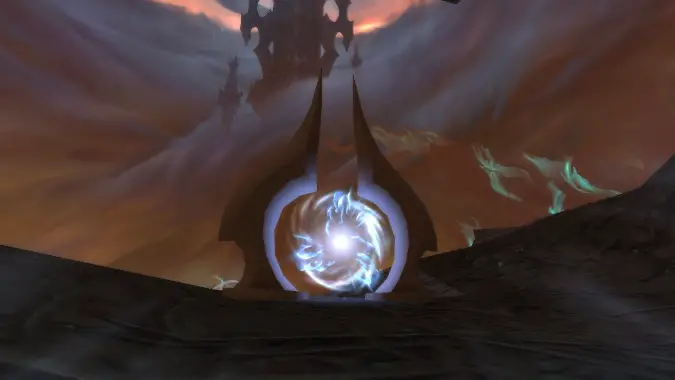
One of most interesting new features added to World of Warcraft in Shadowlands is Torghast, an ever-changing, scalable instance. You can run the dungeon all by yourself, but the difficulty varies by the number of players in the group, and even by the role of the players. As you prepare to enter the door, you have to ask yourself: should you go it alone? Should you ask a guildmate to join you? Should you look for a five-person group in Group Finder? What are the pros and cons of running Torghast solo or with a group?
If you’re not sure how to answer these questions, we’re here to help! Or at least offer advice and try to avoid scaring you away from tackling this tower. Here’s what to consider before you walk into Torghast.
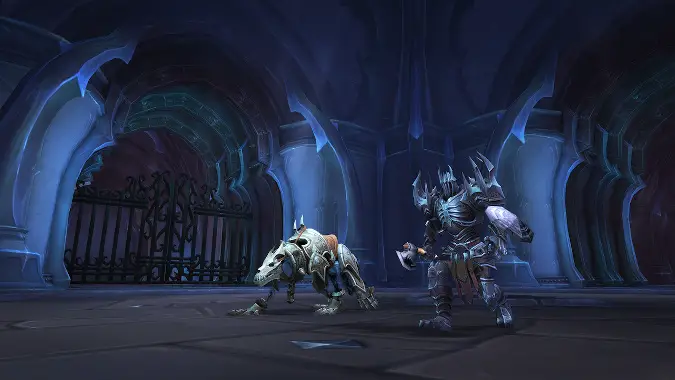
Soloing makes the most sense for tank specs
Mobs, rares, and the final boss in Torghast have more health and deal more damage based on the number of people in the group. The larger the group, the tougher the fights, but more people also means more damage going out which should mean that everything dies quicker. That means Torghast is theoretically pretty balanced for any group size.
But what about healers and tanks? They don’t necessarily deal the same damage as DPS, and Blizzard took that into consideration. If someone in the group is in a tank or healer spec, enemies have reduced health. If you have both a tank and a healer, that decrease stacks — but two tanks wouldn’t reduce the health twice, so don’t plan on an all-tank run being easy.
Though you might think that would favor groups, this also works in a solo instance: tanks and healers have a slightly easier time soloing. When a Balance Druid runs Torghast alone, all the enemies will have more health than when a Guardian Druid runs it solo. But the Guardian Druid can still deal significant damage as well as take a lot more damage — and doesn’t have to worry when pulling large groups. Guardians and other tank classes can usually clear the instance faster because of their high survivability. This appears to be the state of Torghast right now: in same-ilevel gear, tanks can much more easily (and more quickly) clear it than DPS specs. And even though enemies have less health with a healer, the self-healing they need to do to stay on top of damage can slow them down and make it hard to meet DPS checks.
In solo instances, tanks and healers that can deal damage fare extremely well. That doesn’t mean it’s impossible for other specs to solo, but right now tanks have it easier.
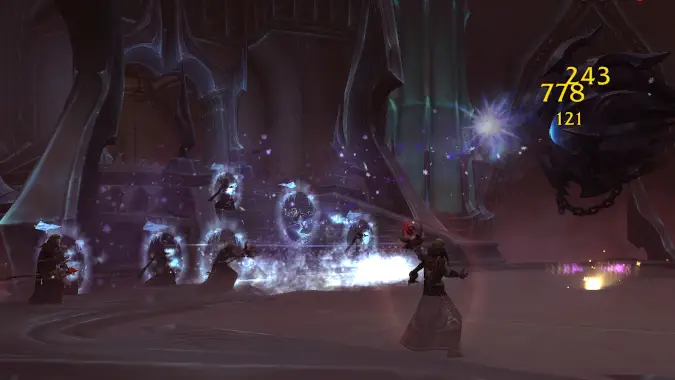
Torghast’s final bosses encourage class diversity
Then there’s the issue of the final boss, which is random — and can be more difficult for some specs than others. For example, some bosses may require interrupts and the fight could be impossible for specs without one or easy for specs with one on a short cooldown. There’s Maw of the Maw, which has a stacking buff that allows it to deal increased damage, and at 10 stacks it becomes immune to damage. You can stun it to make it drop the buff, but if you don’t have a stun it becomes a DPS race to burn it down before it reaches 10 stacks. In a fight like that, a healer hoping to outlast the damage probably wouldn’t be able to finish the fight — and any solo class may have trouble if they don’t have the specific tools to deal with the encounter.
Boss mechanics encourage class variety: different classes have tools to handle different encounters, and having the right class composition can be the difference between success and failure in a boss fight. For a solo player, they may reach the end of Floor 6, only to realize they have no way to complete it. That’s a risk for any group, but it’s more dangerous for solo players who have fewer tools to handle boss mechanics.
As gear availability goes up, Torghast does become easier, and therefore, easier to solo. Since this does not scale with gear, what was once difficult will start to feel a lot easier. Bosses that seemed impossible because they required an interrupt, can now be burned down quickly.
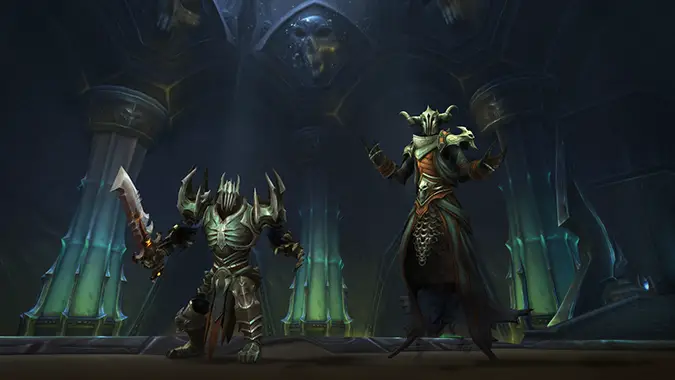
Group scaling can turn survivable damage into a one-shot
Enemy damage and health increases as the group size increases, and it increases a lot. Solo, a Beast Master Hunter’s pet can reasonably handle the enemies without dying often (even elites and rares), and the final boss is a little more difficult, but still doable. Once the Hunter starts grouping up with other people, the damage output becomes too much for the pet. While there’s no role requirement for a Torghast group — a group of all DPS, or even all Healers could enter — the enemies ramp up significantly, which can pose a problem for groups. Just going from solo to duo will be noticeable. If you have a good group composition, this could be fine. But if you’re running with our theoretical five-Hunter party, you’re going to struggle.
A tank who’s soloed Torghast will notice it’s quite a bit more difficult in a group. While solo they may be able to pull half a floor and be fine, in a group as small as three players, that will wipe them. This makes Torghast take longer, even though your larger group is dealing out more damage, that enemy health increase slows things down. A healer also offsetting the health can help, and depending how well the tank can self-heal, might be necessary to keep larger groups alive with the increased damage.
Because of the current scaling, at the moment a tank, healer, and one DPS is a fairly easy group. Adding two more DPS, to make it more like a dungeon run, increases the difficulty significantly. However, it might still be better — for those DPS, not for the tank and healer — than running it solo if they were to have a difficult final boss.
One more note about Torghast’s scaling: Traps! Torghast is full of traps. Spikes and fire shooting out of the floor. Axes swinging from side to side. They hurt. And they hurt more when there are more players in a group. A tank can’t exactly taunt this damage away, and larger groups have to be extremely careful to avoid (or use creative means to bypass) traps they come across. A Warlock to put down a Demonic Gateway. A Priest to shield and then Leap of Faith players through the spikes.
There are lots of ways for a group to survive Torghast’s traps, but the larger your group, the more careful you have to be. In a solo run, traps will deal some damage, but one or two hits probably won’t kill you — especially if you’re a tank. In a five player run, one axe could decapitate you.
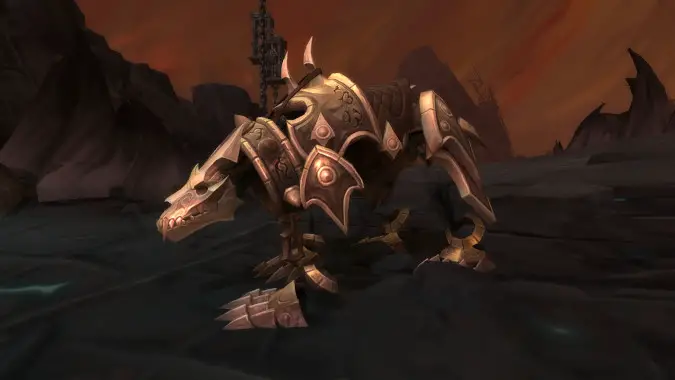
How does Twisting Corridors play into this?
Twisting Corridors is just like regular Torghast, times three! It’s three times as long, and it is more difficult. The earlier Layers will be simple at first. When entering Layer 1, the first six floors will feel like you’ve entered Layer 1 of regular Torghast. Beginning at Floor 7 the difficulty will jump, but if you’ve completed Layer 8 in standard Torghast, this may still feel pretty easy. If you’ve run higher Torghast Layers solo before, and if you have decent gear, go ahead and solo Twisting Corridors at your leisure.
When you reach the upper Layers, then you have a decision to make. There are players who have soloed it. There are groups that have formed from Group Finder that have defeated Layer 8 together. But it can certainly be a challenge. It becomes a situation of whether or not you like that solo-challenge, of investing hours of slow pulls and careful planning on your own — or whether you prefer the faster group dynamic of a full party.
This will be a trial and error, and a risk of time lost, and possibly angry players throwing blame around. Be aware that the upper floors of Twisting Corridors — and particularly that final boss — will be harder than anything you’ve done in Torghast. Knowing that, take on what you think can handle.
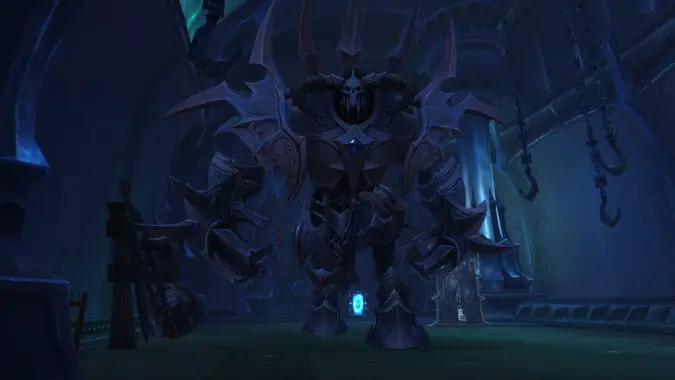
Should you run Torghast in a group or not?
The answer is a solid maybe. Your class, spec, and how you play will determine the best way to run, and gear will also change how much you can handle.
Soloing shouldn’t be a problem if:
- You have a decent ilevel.
- You’re a tank. You can probably breeze right through without worrying about your ilevel.
- You enjoy solo challenges.
Consider a group if:
- You’re in lower ilevel gear, particularly if you’re a DPS in leveling gear.
- You’re going for higher Layers, especially Twisting Corridors.
Small groups are fine. In a group, a tank is almost necessary and a healer is strongly recommended, though Torghast won’t require you to have either. Because it scales based on the number of players, make Torghast a bit tougher for a full five-player group, while a small group of two or three people could do great. It really all depends on the players.
A group with a poor class composition — like all DPS, or two healers — isn’t ideal, and increases the challenge. It’s not impossible, of course, but it requires more coordination, more damage output, a higher ilevel, and maybe a longer time commitment from those involved. Pretend it’s a dungeon, and fill the roles accordingly.
So keep gearing up, find players you can rely on, and get through Twisting Corridors Layer 8 to earn your Corridor Creeper.
Originally published 12/11/2020, updated 1/18/2020
Please consider supporting our Patreon!
Join the Discussion
Blizzard Watch is a safe space for all readers. By leaving comments on this site you agree to follow our commenting and community guidelines.




